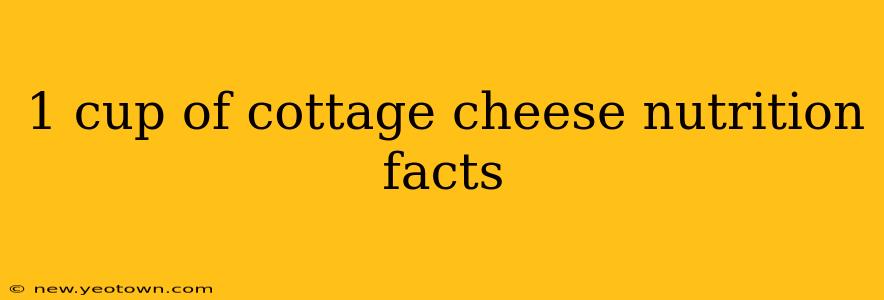Unpacking the Nutritional Powerhouse: A Deep Dive into 1 Cup of Cottage Cheese
Cottage cheese, that creamy, slightly tangy dairy delight, isn't just a delicious snack; it's a nutritional powerhouse packed with protein, calcium, and other essential nutrients. But what exactly are we getting when we indulge in a cup? Let's unpack the nutritional facts and delve into the benefits of this often-underestimated food.
Imagine this: You're preparing a late-night snack, seeking something both satisfying and healthy. Your eyes land on a container of cottage cheese. But a nagging question pops up: What exactly is in that creamy goodness? This post will answer that and more.
1 Cup of Cottage Cheese: The Nutritional Breakdown
The exact nutritional content of a cup of cottage cheese can vary slightly depending on the brand and fat content (low-fat, reduced-fat, whole milk). However, a general guideline for a 1-cup (226g) serving of low-fat cottage cheese reveals a treasure trove of goodness:
-
Protein: Around 28 grams. This is significant for muscle building, repair, and satiety. Protein keeps you feeling fuller for longer, making cottage cheese an excellent choice for weight management.
-
Calcium: A substantial amount, often exceeding 20% of the recommended daily intake. Crucial for strong bones and teeth.
-
Vitamin B12: Cottage cheese is a good source of this essential vitamin, important for nerve function and red blood cell formation.
-
Riboflavin (Vitamin B2): Another B vitamin that contributes to energy production and healthy cell function.
-
Phosphorus: Important for bone health, energy production, and cell signaling.
Addressing Your Burning Questions About Cottage Cheese Nutrition:
How many calories are in 1 cup of cottage cheese?
The calorie count for a cup of cottage cheese varies according to the fat content. Low-fat varieties typically range from 150-200 calories per cup. Full-fat versions will have considerably more calories.
Is cottage cheese good for weight loss?
Yes, cottage cheese can be a valuable asset in a weight-loss plan. Its high protein content promotes satiety, reducing overall calorie intake. The protein also helps preserve muscle mass during weight loss, which is crucial for maintaining a healthy metabolism.
What are the benefits of eating cottage cheese?
Beyond weight management, the benefits extend to improved bone health thanks to the calcium and phosphorus content; better muscle recovery and growth due to the high protein levels; and increased energy levels from B vitamins.
Is cottage cheese high in sodium?
Some brands of cottage cheese can be relatively high in sodium. Always check the nutrition label and choose lower-sodium options whenever possible.
What are the best brands of cottage cheese?
There is no single "best" brand, as preferences vary. Many popular brands offer various fat content options, so it's essential to find one that suits your dietary needs and taste preferences. Read reviews and compare labels before selecting a brand.
Can I eat cottage cheese every day?
While cottage cheese is undeniably nutritious, moderation is key with any food. Including it as part of a balanced diet is perfectly fine, but consuming excessive amounts daily might lead to nutrient imbalances or digestive discomfort.
Conclusion:
One cup of cottage cheese is a delicious and nutritious addition to a healthy diet. Its impressive protein, calcium, and vitamin content offer a wide array of health benefits, from weight management and bone health to muscle growth and energy production. However, always be mindful of the fat and sodium content when selecting a brand, and incorporate it as part of a well-balanced eating plan. The next time you’re looking for a healthy and satisfying snack or meal addition, remember the nutritional powerhouse that is cottage cheese!

